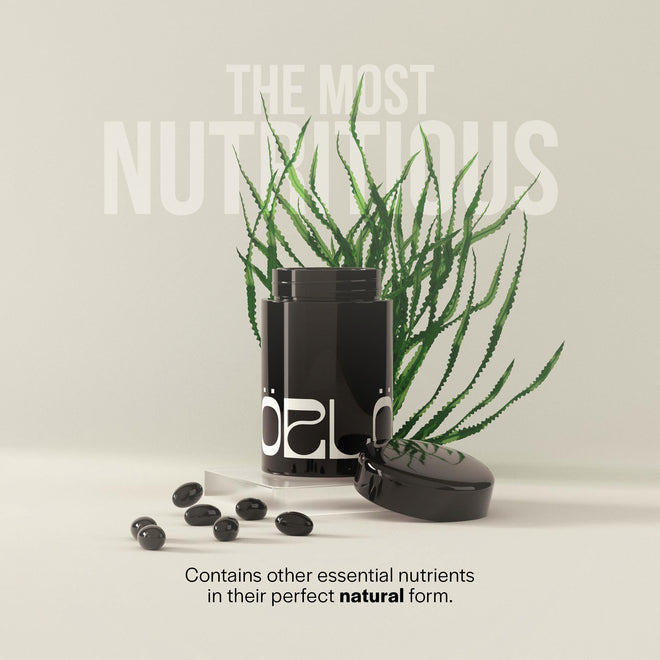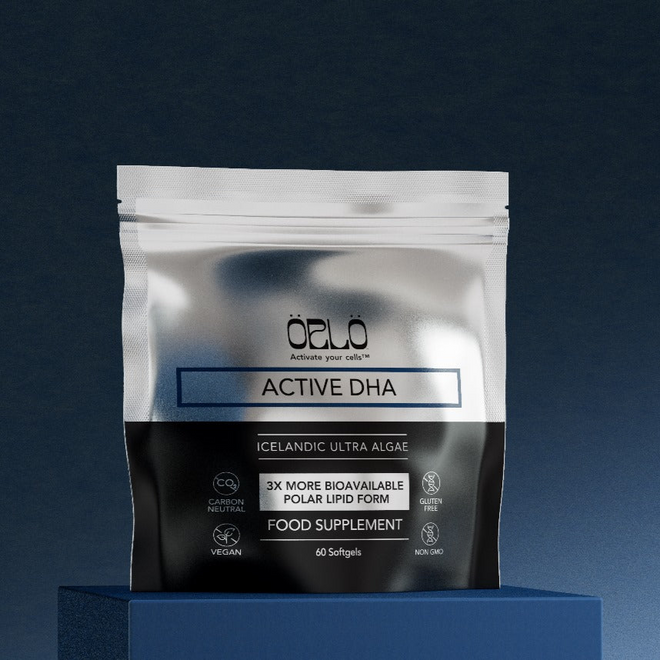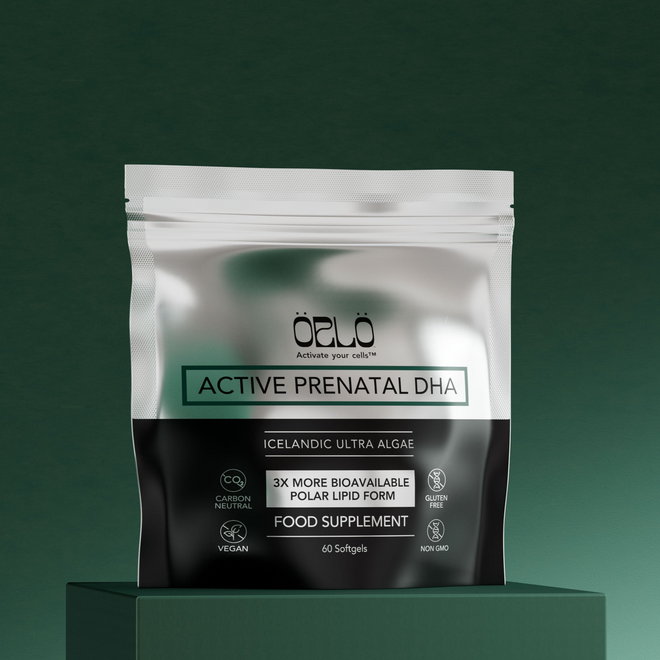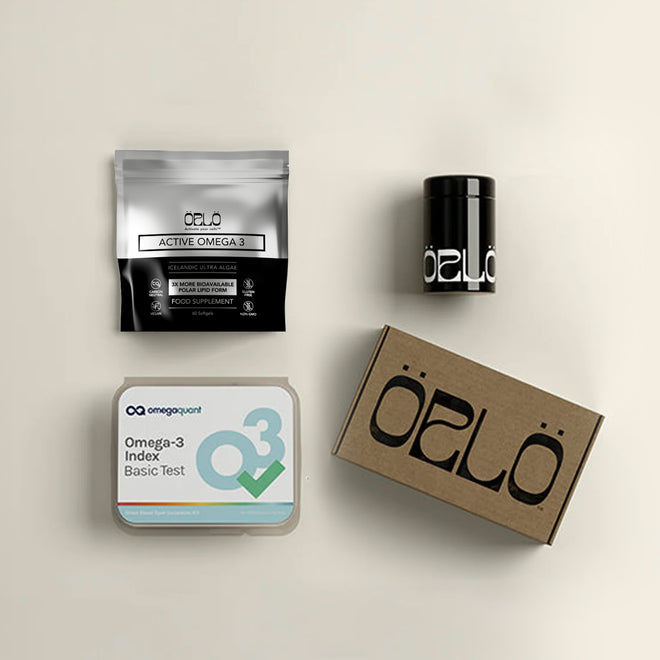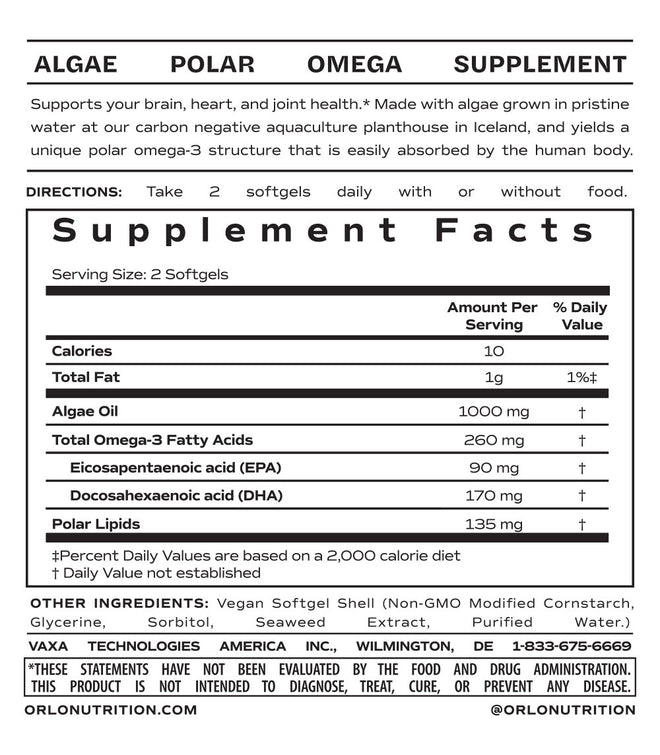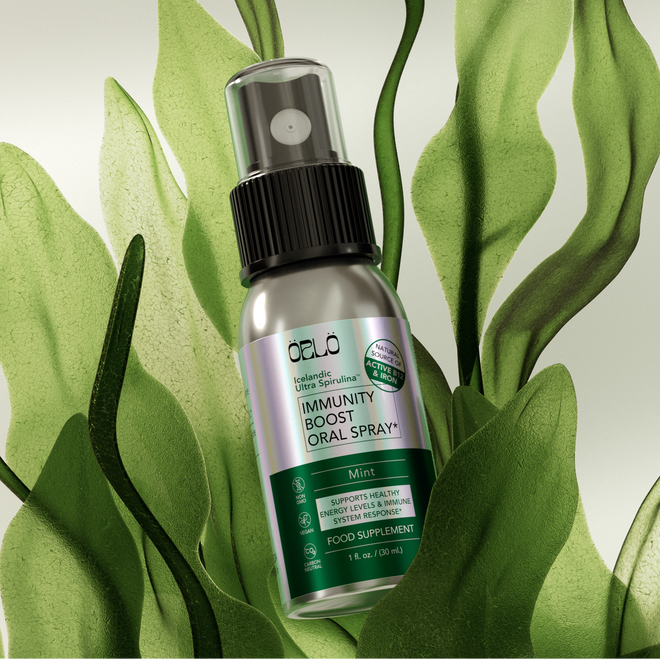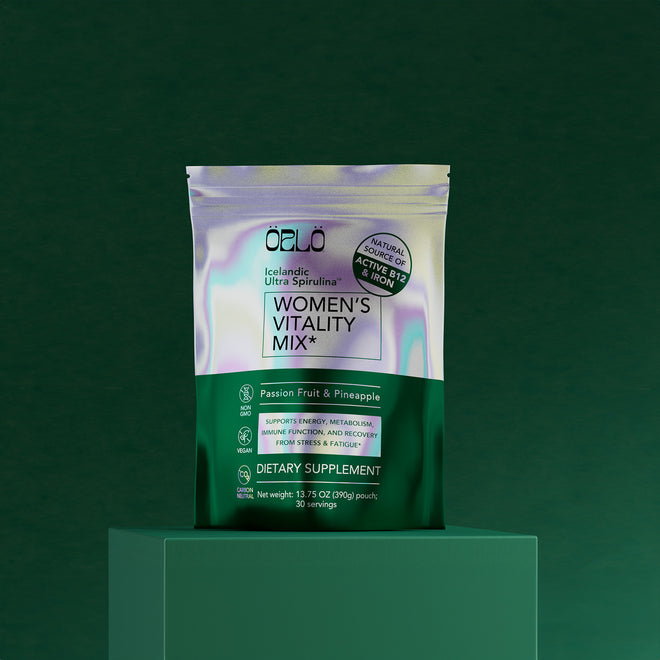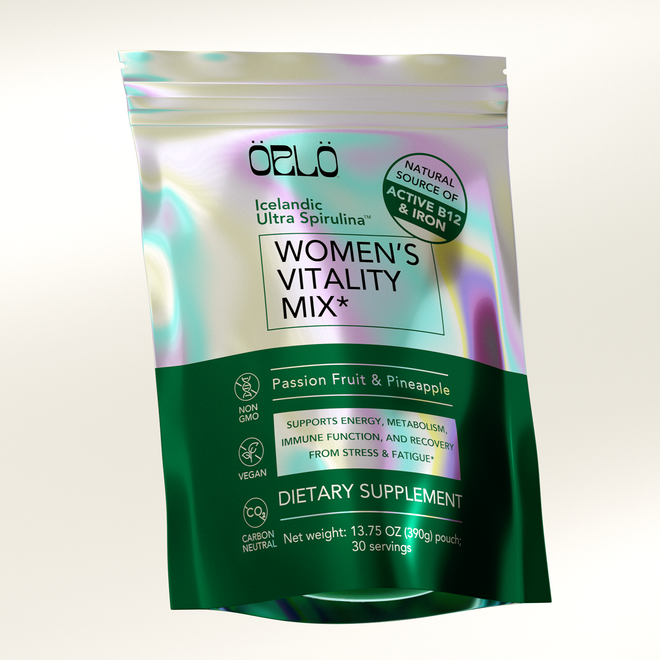Free shipping on purchases over $69
Living with Polycystic Ovary Syndrome (PCOS)
Written by: Marci Clow, MS, RDN
A chronic condition that affects women of reproductive age, polycystic ovary syndrome (PCOS) is characterized by a hormonal imbalance that leads to ovarian cysts, irregular periods, acne, and weight gain. Between 8% and 13% of women between ages 15 and 44 have PCOS, yet many remain undiagnosed, with most cases being detected when trying to achieve pregnancy. The risk for PCOS tends to be increased in women who are obese or who have a biological relative with PCOS. This article will dive deep into symptoms, potential causes, and how to live your best life if diagnosed with PCOS.
What is PCOS?
Androgens are male sex hormones that are normally present in females in small amounts but are elevated in women with PCOS. When androgens are overproduced in the ovaries, some women form cysts (fluid-filled sacs), which is where the name polycystic—literally meaning many cysts—is derived. High androgen levels result in an imbalance of female reproductive hormones and can lead to an irregular menstrual cycle and other symptoms of PCOS, which we will get to shortly.
What Are the Symptoms of PCOS?
PCOS is a condition that can present with a wide variation of symptoms, which may change over time in affected individuals. In women with obesity, symptoms tend to be more severe. Some of the physical symptoms typically present with PCOS include:
● Irregular periods: Having fewer, heavier, longer, intermittent, or no menstruation at all can be indications of PCOS.
● Atypical facial and body hair: High androgen levels can cause excess hair growth, which is known as hirsutism. On the other extreme, hair thinning or male-pattern baldness can occur.
● Acne: As a result of the hormonal imbalances associated with PCOS, acne breakouts and oily skin are often associated with PCOS.
● Weight gain: Abdominal weight gain is linked to PCOS. Women with PCOS may also experience problems with bloating.
● Skin tags or peculiar skin patches: Small pieces of excess skin, known as skin tags, often occur in the armpits or on the neck in women with PCOS. Additionally, dark or thick skin patches on the back of the neck, under the breasts, or in the armpits may occur.
What Causes PCOS?
The symptoms of PCOS are primarily caused by elevated androgen, but what exactly causes PCOS to occur is unknown. Researchers have suggested that genetic and environmental factors may be responsible. Other contributing factors may include:
● Insulin resistance. Our bodies break down food into glucose, which is the primary fuel for our cells to produce energy. When blood glucose goes up, the pancreas is signaled to release insulin, a hormone necessary to get glucose into the cells. If cells become resistant to insulin, blood sugar levels go up, and the pancreas tries to make more insulin to bring the blood sugar down. Too much insulin can cause excess androgens, resulting in some physical symptoms discussed above.
● Low-grade inflammation. A normal inflammatory response occurs in response to infection, injury, or other threats. Several studies have reported a correlation between chronic low-grade inflammation and hyperandrogenism in women with PCOS.
● Heredity. As mentioned, PCOS often occurs in families, leading researchers to link the cause of PCOS to a genetic component.
What Are Some Potential Complications of PCOS?
Infertility is a common complication of PCOS, resulting from irregular menstrual cycles and excess androgen interfering with the growth and release of eggs from the ovaries (ovulation). However, women with PCOS are still able to achieve pregnancy with fertility treatments that induce ovulation.
Other complications associated with PCOS include an increased likelihood of developing type 2 diabetes, uterine/endometrial cancer, sleep apnea, and depression and/or anxiety. Additionally, higher rates of the cluster of conditions, including high blood pressure, high blood glucose, and elevated cholesterol or triglyceride levels that increase the risk of cardiovascular disease, collectively known as metabolic syndrome, are often seen in women with PCOS.
How is PCOS Diagnosed?
The presence of symptoms, in addition to a physical exam, blood tests, and ultrasounds, are used to diagnose PCOS. As mentioned above, signs of an increased level of androgens can include unwanted facial or body hair, thinning of hair from the head, acne, and irregular periods. An ultrasound is used to identify the presence of polycystic ovaries, but some women with PCOS do not present with cysts. Blood tests may be used to determine levels of hormones that are typically elevated in women with PCOS, and often thyroid hormone, fasting cholesterol and triglycerides, and glucose tolerance are also assessed.
What Is the Treatment for PCOS?
Unfortunately, there is no cure for PCOS, nor is there a one-size-fits-all treatment plan. However, medications and alternative treatments are available to improve or help stave off symptoms. In addition, adjustments to diet and lifestyle can make living with PCOS more tolerable. Treatment plans are highly individualized because of the variations in the severity of PCOS. One constant that applies to all PCOS patients is that discussing all potential treatment options with your healthcare team is extremely important.
Medications:
● Hormonal birth control: Some doctors may prescribe the pill, patch, shot, or even an intrauterine device (IUD) to help regulate the menstrual cycle, lower the risk of uterine/endometrial cancer, and improve skin and erratic hair growth.
● Anti-androgens: These medicines block the effect of androgens but can cause birth defects, so they should not be used if planning on becoming pregnant. They can help reduce facial and body hair growth, acne, and hair loss from the scalp.
● Metformin: This medication improves insulin resistance and is prescribed for the treatment of type 2 diabetes. Metformin may also affect androgen levels and plays a role in restarting ovulation if infertility becomes an issue.
● Acne/Hair Growth Meds: Oral and topical medications can also help manage acne and hair growth.
Lifestyle:
● Weight Management: Shedding a few pounds and engaging in regular physical activity can help alleviate symptoms of PCOS. Weight loss also helps to lower blood glucose and improve insulin sensitivity. Research has shown that even losing 10% of your body weight (15 pounds if you weigh 150) can help regulate the menstrual cycle.
● Dietary Intake: Regardless of a PCOS diagnosis, an ideal dietary pattern should include a variety of vegetables and fruits, lean proteins, and whole grains. A focus on reducing intake of added sugars and other refined carbohydrates, in addition to adding fiber-rich foods will help control blood sugar levels.
● Exercise: For women with PCOS engaging in regular exercise benefits overall health and can help lower blood glucose, combat excess weight that contributes to insulin resistance, lower cholesterol, and decrease excess androgens.
● Dietary Supplements: From B-vitamins, such as inositol, and minerals, such as zinc, to Chinese herbal formulations, there is a slew of supplemental ingredients touted for supporting symptoms of PCOS. For some supplements, their effectiveness is purely anecdotal; others have clinical evidence for benefitting women with PCOS. It is always important to check with your healthcare practitioner before using any supplement to assess the safety, appropriate dose, and if the particular supplement you are interested in is suited for your individual circumstances. Two supplemental ingredients that may beneficially affect PCOS include:
o Myo-inositol: A meta-analysis of studies in women with PCOS suggests that myo-inositol may help lower androgens.
o Omega-3s: A review of the research suggests that omega-3 fatty acids support a healthy inflammatory response and may play a role in insulin resistance and cholesterol management. Further large-scale trials are needed to confirm these effects in women with PCOS.
● Acupuncture: For women with PCOS, acupuncture may help regulate menstrual cycles and help with ovulation. It may also improve mental health and pain associated with PCOS.
● Mental Health Support: An unfortunate “side effect” of PCOS is a negative impact on mental health, including an increased risk of mood swings, depression, and anxiety. Often, the symptoms caused by altered androgen levels in women with PCOS are the core cause of their mental health issues. Exercise, diet, and support from friends, family, and your healthcare provider are critical components for healthy mental well-being.
In addition to discussing treatments with your primary healthcare provider, there are additional resources, such as support groups and patient advocacy organizations, that can help women navigate a PCOS diagnosis. A great start is the PCOS Awareness Association, where you can find evidence-based information and get support by becoming part of their “cysterhood.” The nutrition editor of the must-have book “A Patients Guide to PCOS,” Martha McKittrick, RD, is also a phenomenal resource, and affordable meal and snack e-guides targeted at PCOS patients are available on her website.
Key Takeaways
There is no “typical” when it comes to PCOS. The symptoms, potential complications, and effectiveness of treatment vary widely among women who have this chronic condition. Researchers continue to explore new ways to manage PCOS, with current studies focusing on genetics, ethnic differences, medicines, supplements, and links to other health problems. For now, the good news is that there is a wide range of treatment options and many resources available to allow women with PCOS to live their best lives.
References
Aboeldalyl S, James C, Seyam E, et al. The role of chronic inflammation in polycystic ovarian syndrome-a systematic review and meta-analysis. Int J Mol Sci. 2021;22(5):2734. doi:10.3390/ijms22052734
Alesi S, Ee C, Moran LJ, et al. Nutritional supplements and complementary therapies in polycystic ovary syndrome. Adv Nutr. 2022;13(4):1243-1266. doi:10.1093/advances/nmab141
Futterweit W, Ryan G. A Patient's Guide to PCOS: Understanding--and Reversing--Polycystic Ovary Syndrome. Holt Paperbacks, 2006.
Gu Y, Zhou G, Zhou F, et al. Modifications and PCOS: old story but new tales. Front Endocrinol (Lausanne). 2022;13:808898. doi:10.3389/fendo.2022.808898
Lim SS, Hutchison SK, Van Ryswyk E, et al. Lifestyle changes in women with polycystic ovary syndrome. Cochrane Database Syst Rev. 2019;3(3):CD007506. doi:10.1002/14651858.CD007506.pub4
Melo V, Silva T, Silva T, et al. Omega-3 supplementation in the treatment of polycystic ovary syndrome (PCOS) - a review of clinical trials and cohort. Endocr Regul. 2022;56(1):66-79. doi:10.2478/enr-2022-0008
PCOS Awareness Association. Accessed June 27, 2024. https://www.pcosaa.org/
Polycystic ovary syndrome. U.S. Department of Health & Human Services, Office on Women’s Health. Updated February 22, 2021. Accessed June 25, 2024. https://www.womenshealth.gov/a-z-topics/polycystic-ovary-syndrome
Polycystic ovary syndrome. World Health Organization. Updated June 28, 2023. Accessed June 25, 2024. https://www.who.int/news-room/fact-sheets/detail/polycystic-ovary-syndrome
Rao M, Khan AA, Adnan QUA. Effects of high-intensity interval training and strength training on levels of testosterone and physical activity among women with polycystic ovary syndrome. Obstet Gynecol Sci. 2022;65(4):368-375. doi:10.5468/ogs.22002
Unfer V, Facchinetti F, Orrù B, et al. Myo-inositol effects in women with PCOS: a meta-analysis of randomized controlled trials. Endocr Connect. 2017;6(8):647-658. doi:10.1530/EC-17-0243
Unluhizarci K, Karaca Z, Kelestimur F. Role of insulin and insulin resistance in androgen excess disorders. World J Diabetes. 2021;12(5):616-629. doi:10.4239/wjd.v12.i5.616
Marci Clow is a registered dietitian nutritionist and the founder of Clowt Content, an organization which provides evidence-based content on a wide range of food and nutrition topics. The information presented here is intended only to be educational and provide readers with information; it is not an endorsement of the writer for any particular product. These statements have not been evaluated by the Food and Drug Administration. Dietary supplements are not intended to diagnose, treat, cure, or prevent any disease.

